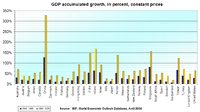
Photo from wikipedia
Abstract Rhizobacteria inhabiting the soil adhering to the root of the host plants are generally recognized to possess plant growth promoting properties. In the present study, a total of 120… Click to show full abstract
Abstract Rhizobacteria inhabiting the soil adhering to the root of the host plants are generally recognized to possess plant growth promoting properties. In the present study, a total of 120 rhizobacterial isolates from native soil samples of sunflower were isolated and screened for their ACC deaminase (ACCd) activity and plant growth promoting properties. A significant ACCd activity ranging between 322.55 and 2085.06 nmol of α-ketobutyrate mg−1 of protein h−1 was observed in 44 isolates with the maximum activity offered by Bacillus subtilis Rhizo SF 48. The rhizobacteria which produced more than 50% α-ketobutyrate were selected to evaluate their efficacy to promote the plant growth under laboratory and greenhouse conditions in sunflower. All the ten ACCd positive isolates were found to exhibit at least four different PGP traits and three were found antagonistic to Fusarium oxysporum. The seed treatment with ACCd producing PGPR also significantly enhanced both seed and vegetative growth parameters compared to control with a maximum enhancement offered by B. subtilis Rhizo SF 48. The findings of the study highlight the efficacy of ACCd producing PGPR in promoting growth parameters in sunflower plants upon seed treatment further warranting to test their ability in the suppression of biotic and abiotic stress.
Journal Title: Biocatalysis and Agricultural Biotechnology
Year Published: 2019
Link to full text (if available)
Share on Social Media: Sign Up to like & get
recommendations!